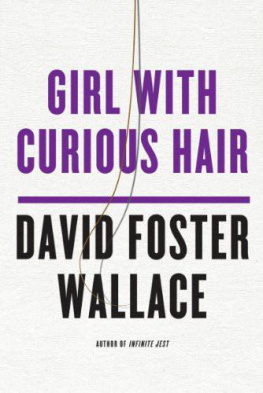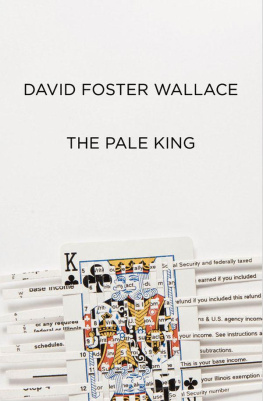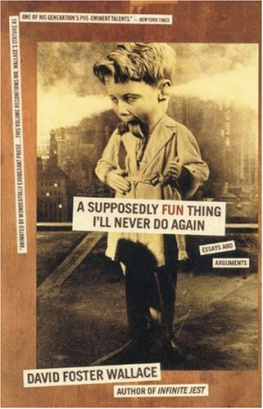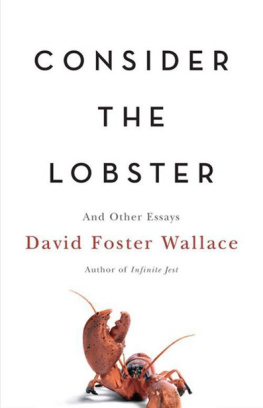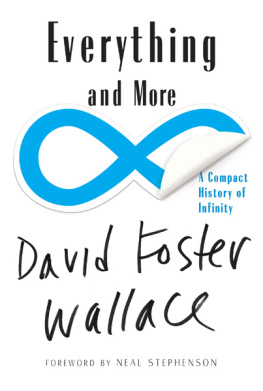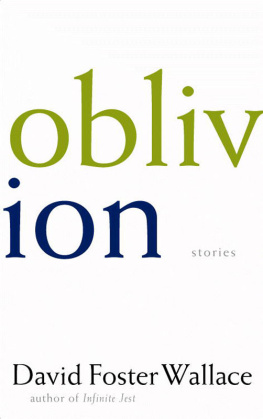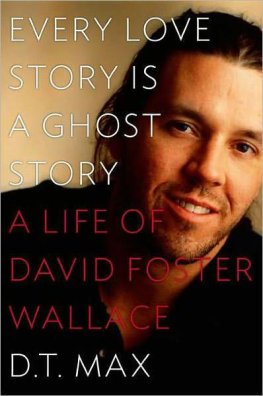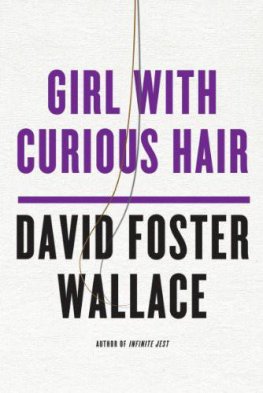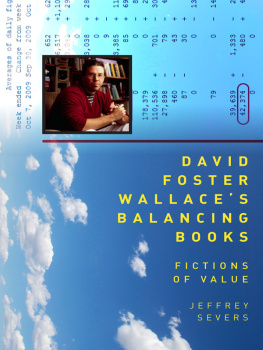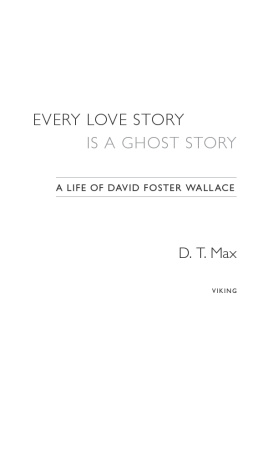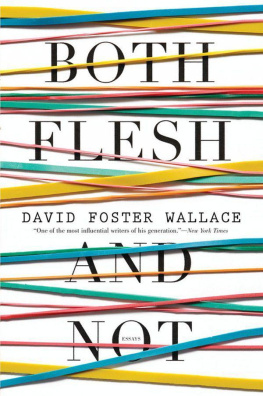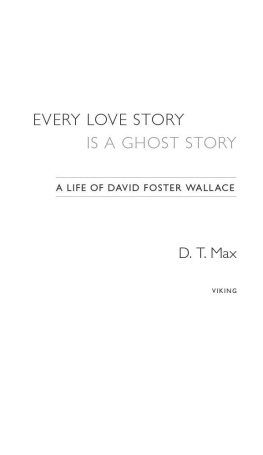me@page { margin-bottom: 5.000000pt; margin-top: 5.000000pt; }
GIRL WITH
CURIOUS HAIR
ALSO BY DAVID FOSTER WALLACE
The Broom of the System
Infinite Jest
A Supposedly Fun Thing I'll Never Do Again
Brief Interviews with Hideous Men
GIRL WITH CURIOUS HAIR
DAVID FOSTER WALLACE
These stories are 100 percent fiction. Some of them project the names of "real" public figures onto made-up characters in made-up circumstances. Where the names of corporate, media, or political figures are used here, those names are meant only to denote figures, images, the stuff of collective dreams; they do not denote, or pretend to private information about, actual 3-D persons, living, dead, or otherwise.
Part of "Little Expressionless Animals" makes use of the third stanza of John Ashbery's "Self-Portrait in a Convex Mirror" from John Ashbery's Selected Poems (Viking Press, 1985, pp. 192-193).
Parts of "Westward the Course of Empire Takes Its Way" are written in the margins of John Barth's "Lost in the Funhouse" and Cynthia Ozick's "Usurpation (Other People's Stories)"; p. 294 of "Westward" contains the first seven lines of "Usurpation," from Cynthia Ozick's Bloodshed and Three Novellas (Afred A. Knopf, 1976, p. 132).
Acknowledgment is made to the following publications in which some of the stories in this book originally appeared: "Little Expressionless Animals" in the Paris Review; "Lyndon" in Arrival; "Here and There" in Fiction; "John Billy" in Conjunctions; "My Appearance" in Playboy under the title "Late Night"; "Say Never" in the Florida Review; "Everything Is Green" in Puerto de Sol and Harper's.
Copyright 1989 by David Foster Wallace
ACKNOWLEDGMENT OF SUPPORT TO:
The Trustees of the Arizona Humanities Fellowship
The Mr. And Mrs. Wallace Fund for Aimless Children
The Mrs. Giles Whiting Foundation
The Corporation of Yaddo
ISBN 0-393-31396-4
CONTENTS
FOR L
me@page { margin-bottom: 5.000000pt; margin-top: 5.000000pt; }
LITTLE EXPRESSIONLESS ANIMALS
IT'S 1976. The sky is low and full of clouds. The gray clouds are bulbous and wrinkled and shiny. The sky looks cerebral. Under the sky is a field, in the wind. A pale highway runs beside the field. Lots of cars go by. One of the cars stops by the side of the highway. Two small children are brought out of the car by a young woman with a loose face. A man at the wheel of the car stares straight ahead. The children are silent and have very white skin. The woman carries a grocery bag full of something heavy. Her face hangs loose over the bag. She brings the bag and the white children to a wooden fencepost, by the field, by the highway. The children's hands, which are small, are placed on the wooden post. The woman tells the children to touch the post until the car returns. She gets in the car and the car leaves. There is a cow in the field near the fence. The children touch the post. The wind blows. Lots of cars go by. They stay that way all day.
It's 1970. A woman with hair like fire sits several rows from a movie theater's screen. A child in a dress sits beside her. A cartoon has begun. The child's eyes enter the cartoon. Behind the woman is darkness. A man sits behind the woman. He leans forward. His hands enter the woman's hair. He plays with the woman's hair, in the darkness. The cartoon's reflected light makes faces in the audience flicker: the woman's eyes are bright with fear. She sits absolutely still. The man plays with her red hair. The child does not look over at the woman. The theater's cartoons, previews of coming attractions, and feature presentation last almost three hours.
Alex Trebek goes around the "JEOPARDY!" studio wearing a button that says PAT SAJAK LOOKS LIKE A BADGER. He and Sajak play racquetball every Thursday.
It's 1986. California's night sky hangs bright and silent as an empty palace. Little white sequins make slow lines on streets far away under Faye's warm apartment.
Faye Goddard and Julie Smith lie in Faye's bed. They take turns lying on each other. They have sex. Faye's cries ring out like money against her penthouse apartment's walls of glass.
Faye and Julie cool each other down with wet towels. They stand naked at a glass wall and look at Los Angeles. Little bits of Los Angeles wink on and off, as light gets in the way of other light.
Julie and Faye lie in bed, as lovers. They compliment each other's bodies. They complain against the brevity of the night. They examine and reexamine, with a sort of unhappy enthusiasm, the little ignorances that necessarily, Julie says, line the path to any real connection between persons. Faye says she had liked Julie long before she knew that Julie liked her.
They go together to the O.E.D. to examine the entry for the word "like."
They hold each other. Julie is very white, her hair prickly short. The room's darkness is pocked with little bits of Los Angeles, at night, through glass. The dark drifts down around them and fits like a gardener's glove. It is incredibly romantic.
On 12 March 1988 it rains. Faye Goddard watches the freeway outside her mother's office window first darken and then shine with rain. Dee Goddard sits on the edge of her desk in stocking feet and looks out the window, too. "JEOPARDY!" 's director stands with the show's public relations coordinator. The key grip and cue-card lady huddle over some notes. Alex Trebek sits alone near the door in a canvas director's chair, drinking a can of soda. The room is reflected in the dark window.
"We need to know what you told her so we can know whether she'll come," Dee says.
"What we have here, Faye, is a twenty-minutes-tops type of thing," says the director, looking at the watch on the underside of her wrist. "Then we're going to be in for at least another hour's setup and studio time. Or we're short a slot, meaning satellite and mailing overruns."
"Not to mention a boy who's half catatonic with terror and general neurosis right this very minute," Muffy deMott, the P.R. coordinator, says softly. "Last I saw, he was fetal on the floor outside Makeup."
Faye closes her eyes.
"My husband is watching him," says the director.
"Thank you ever so much, Janet," Dee Goddard says to the director. She looks down at her clipboard. "All the others for the four slots are here?"
"Everybody who's signed up. Most we've ever had. Plus a rather scary retired WAC who's not even tentatively slotted till late April. Says she can't wait any longer to get at Julie."
"But no Julie," says Muffy deMott.
Dee squints at her clipboard. "So how many is that all together, then?"
"Nine," Faye says softly. She feels at the sides of her hair.
"We got nine," says the director; "enough for at least the full four slots with a turnaround of two per slot." The rain on the aluminum roof of the Merv Griffin Enterprises building makes a sound in this room, like the frying of distant meat.
"And I'm sure they're primed," Faye says. She looks at the backs of her hands, in her lap. "What with Janet assuming the poor kid will bump her. Your new mystery data guru."
"Don't confuse the difference between me, on one hand, and what I'm told to do," says the director.
"He won't bump her," the key grip says, shaking her head. She's chewing gum, stimulating a little worm of muscle at her temple.
Alex Trebek, looking at his digital watch, begins his pre-slot throat-clearing, a ritual. Everyone in the room looks at him.
Dee says, "Alex, perhaps you'd put the new contestants in the booth for now, tell them we may or may not be experiencing a slight delay. Thank them for their patience."
Alex rises, straightens his tie. His soda can rings out against the metal bottom of a wastebasket. He clears his throat.
"A good host and all that." Dee smiles kindly.
Next page
